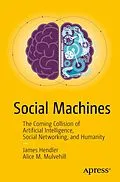Will your next doctor be a human being-or a machine? Will you have a choice? If you do, what should you know before making it?
This book introduces the technically-engaged reader to the convergence of two technologies: artificial intelligence in its modern incarnation and the growing trend of social networking to "reach off the Web" into the real world. Both these technologies are important in their own right, but as they converge we are approaching an historic inflection point in the partnership between human beings and machines with profound impacts on the future not only of computing but of our world.
In this book, AI expert and researcher James Hendler explores the social implications of artificial intelligence systems in the context of a close examination of the technologies that make them possible. The author evaluates the utopian and dystopian prognostications of the social implications of the convergence of AI and social networking. Social Machines: The Coming Collision of Artificial Intelligence, Social Networking, and Humanity is your field guide to the future of your personal relationships with the machines that are already changing your life and to the future of your machine-mediated relationships with other human beings and humanoid constructs.
Autorentext
James Hendler is the Director of the Institute for Data Exploration and Applications and the Tetherless World Professor of Computer, Web and Cognitive Sciences at RPI. He also serves as a Director of the UK's charitable Web Science Trust. Hendler has authored over 250 technical papers in the areas of Semantic Web, artificial intelligence, agent-based computing and high performance processing. One of the originators of the Semantic Web, Hendler was the recipient of a 1995 Fulbright Foundation Fellowship, is a former member of the US Air Force Science Advisory Board, and is a Fellow of the American Association for Artificial Intelligence, the British Computer Society, the IEEE and the AAAS. He is also the former Chief Scientist of the Information Systems Office at the US Defense Advanced Research Projects Agency (DARPA) and was awarded a US Air Force Exceptional Civilian Service Medal in 2002. He is also the first computer scientist to serve on the Board of Reviewing editors for Science. In 2010, Hendler was named one of the 20 most innovative professors in America by Playboy magazine and was selected as an Internet Web Expert by the US government. In 2012, he was one of the inaugural recipients of the Strata Conference Big Data awards for his work on large-scale open government data, and he is a columnist and associate editor of the Big Data journal. In 2013, he was appointed by the governor as the Open Data Advisor to New York State and in 2014, he won a prestigious IBM faculty award for his work on cognitive computing and artificial intelligence.
Zusammenfassung
- What the concept of a social machine is and how the activities of non-programmers are contributing to machine intelligence
- How modern artificial intelligence technologies, such as Watson, are evolving and how they process knowledge from both carefully produced information (such as Wikipedia and journal articles) and from big data collections
- The fundamentals of neuromorphic computing, knowledge graph search, and linked data, as well as the basic technology concepts that underlie networking applications such as Facebook and Twitter
- How the change in attitudes towards cooperative work on the Web, especially in the younger demographic, is critical to the future of Web applications
Inhalt
Chapter 1 Introduction.-
Chapter 2 Who Will be Your Next Doctor?.-
Chapter 3 The Games We Play.-
Chapter 4 The Limits of Humans.-
Chapter 5 What Machines Can't Do...Yet.-
Chapter 6 Augmenting Human Capabilities With AI.-
Chapter 7 Social Machines: Embracing the Blur.-
Chapter 8 Social Challenges for the Social Machine.-
Chapter 9 Conclusion: Social Machines and the New Future.
